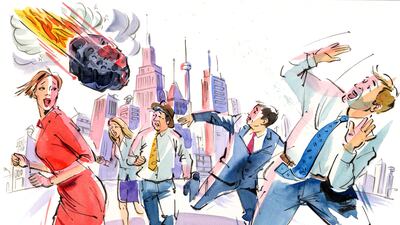With between US$4 trillion and $5tn of assets directly under its control, BlackRock is a giant among giants in the financial world, and until recently was firmly under the eye of the Financial Stability Board (FSB).
Since the global banking crisis, the FSB has labelled 30 banks and nine insurers “systemically important financial institutions” or “too big to fail”, insisting that they operate under greater scrutiny and regulations. For more than 12 months it considered bringing large asset managers such as BlackRock under similar regulatory control but backed down from this stance in June, falling in line with the International Organisation of Securities Commissions who deemed it more important to focus on understanding the risks posed by the sector as a whole rather than worry about specific large firms.
Their reasoning is based on the presumption that, unlike banks, whose loans and deposits go on their balance sheets as assets and liabilities, New York-based BlackRock and its ilk are mere managers of other people’s money. As such, asset managers have control over the investments they hold on behalf of others. In contrast to banks that leverage the money that is deposited with them, asset managers only invest the funds they receive from investors. If an investment goes bad, it loses money but there is no systemic risk to the marketplace that is linked to the asset manager.
In fact, The Economist magazine argues that having a very big player in the "financial pond" actually promotes a healthier financial environment, because an unleveraged asset manager can buy assets cheaply from distressed sellers, which stabilises markets rather than disrupts them.
On the face of it they are probably correct. However, the problem with this theory is that it is not taking into account the effect that concentrated ownership, particularly ownership from an organisation as pervasive as BlackRock, has on other players in the “financial pond”.
While it has already been shown that concentrated ownership may lead to financial fragility, not much evidence exists on the likely future impact of a change in ownership concentration on the behaviour of other investors in the market.
To this end, my colleagues David Schumacher, an assistant professor of finance at McGill University in Montreal, Yan Wang, an assistant professor at Erasmus University, and I examined the impact of the BlackRock’s acquisition of Barclays Global Investors (BGI) in 2009 on a cross section of stocks globally. The deal was a massive one in the industry, directly affecting stocks representing more than 60 per cent of world market capitalisation.
Our research considered two competing hypotheses – one being that increased concentration of ownership would send a positive signal about the quality of the stock the asset manager was buying, heightening interest in the stock, thus increasing liquidity and pushing up the share price.
The other hypothesis considered the possibility that investors would grow concerned over increased concentration due to the potential negative impact on the share price if BlackRock were to experience an idiosyncratic shock that induced a fire sale of its holdings. Or, if investors, pre-empting such a sale, began selling off their stock, inducing other shareholders to do likewise – creating strategic complementarities similar to those at the core of bank runs.
It was this second “fire sale risk” hypothesis which proved to run true. Close inspection of the data indicated that after the BlackRock/BGI acquisition, other institutional investors rebalanced away from stocks where BlackRock’s holdings increased, migrating towards comparable stocks not held by BGI funds prior to the merger. Stocks that experienced large increases in ownership concentration by BlackRock due to the merger experienced negative returns which did not fully revert; they became permanently less liquid and less volatile.
This suggests that when looking at systemic risk in the marketplace, there is a wider issue to consider. When an elephant enters a pond, every move it makes affects the other players in the pond.
If everyone is scared that the big elephant is going to sell, then they move quickly to sell first. That’s what is happening here. Other asset managers are rationally adjusting and accounting for the fear of BlackRock destabilising the market, by avoiding stocks in which it has investments. In the fallout, these – potentially very strong – companies are suffering; their prices are dropping and their liquidity is lower.
BlackRock has skills and economies of scale that delivers benefits for its investors, so they are not necessarily missing out. The big losers are the stocks themselves. The perceived risk is forcing their prices down.
This is not a prediction of what may happen. The concern is not that ‘if BlackRock experiences financial fragility there will be a disaster’, what we are showing is that the market is already accounting for the possibility of a disaster. The financial fragility is driven by fear of future, possibly idiosyncratic, firm events – not necessarily by firm events per se.
Large asset managers such as BlackRock may have control over the investments they hold, but they have no control over how other investors manage their funds. Their very existence is systemically important with very real, unavoidable risk implications.
Massimo Massa is the Rothschild chaired professor of banking and professor of finance at Insead.
Follow The National's Business section on Twitter

